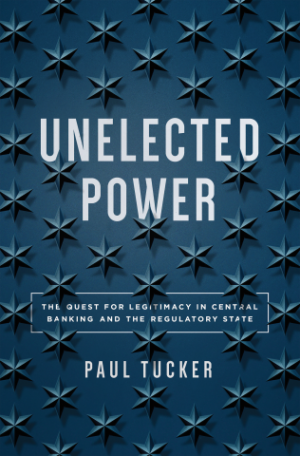25 March 2019
Unelected Power
The quest for legitimacy in central banking and the regulatory state
Paul Tucker
2018, Princeton University Press, 642 pages,
ISBN 9780691196305
Reviewer: Ian Bright

“The current upsurge of debate about technocracy and populism can, therefore, make it seem as if we are approaching a point where choice between illiberal democracy and undemocratic liberalism will be hard to avoid. In a way, the purpose of this book is to challenge that pessimism of absolutes. It explores whether it is possible to find a place for technocratic independent agencies in our system of government without jeopardizing democratic legitimacy. Nearly all the discussion will be dry, but in the background is the need to chart a way through the malaise of false choices about government and, thus, about who we are as political communities.”
These words early on in the book accurately reflect the journey one takes when picking up this lengthy book.
Tucker aims to define more clearly the role of independent agencies – of which central banks are one - under democracies. He aims to bridge the gap between the need for the technical efficiency of the experts with accountability to elected politicians. He does this by setting out design principles for independent agencies. In doing this, he rises above the “enough of experts” throwaway from Michael Gove, the repeated cry of “parasites” and elitists by Douglas Carswell and the persistent challenge to the Federal Reserve by Rand Paul.
The book is heavily influenced by Paul Tucker’s long experience at the Bank of England and international finance forums. It concentrates on the special role of central banks. However, the design principles outlined could be used for any independent agency. But Tucker points out that central banks differ from other independent agencies such as competition authorities, the courts and even the military.
Central banks have arguably always had more wide-ranging powers than other agencies, so it is more difficult to design appropriate principles of operation and ways of accountability for them. This problem has become more pronounced since the global financial crisis. Several central banks now have both banking supervision and system stabilisation roles. Central banks “no longer inhabit a rarefied zone in which experts exercise specialised powers in order to smooth macroeconomic fluctuations” and have moved to be “part of the regulatory state”. Public law has yet to catch up with this. Further, the decisions of central banks have always had distributional effects upon the wealth of society. With the advent of QE and other policies designed to stabilise the financial system, they have a more pronounced distributional effects. Consequently the need for greater democratic oversight has increased.
This may seem as an attack on the much-treasured independence of central banks – but with solid reasons of accountability behind it.
Tucker warns that many sections of the book will be dry. He is not wrong, but that may be necessary to understand the argument. The book is long at over 600 pages. But the journey is worthwhile, even if you need to take short cuts. I suspect few will have the fortitude to read this book sequentially from cover to cover.
The book is in four sections. The introduction and part one outline the challenges presented to democracy in having independent authorities and sets out design principles for independent agencies. Part two discusses how independent authorities fit with political values. Part three looks at real world constraints. Part four concentrates on central banks. Parts one and four could be read separately. Indeed, Tucker suggests this, but it will – as Tucker warns – limit understanding of the many political issues that need should be considered.
For all its strengths, the book is heavily biased to consideration of the UK and US models of central banking and political systems. There is discussion of the situation in Europe with the ECB but the emphasis is Anglo-centric. I found little discussion of the central bank arrangements in Asia or elsewhere. I also found the limited discussion of the issue of the ability of people in finance to move between private and public sectors limited. This “revolving door” problem is especially pertinent in finance as the monetary rewards can be significant and the cries of elitism can be all the more strident when it comes to central banking.
